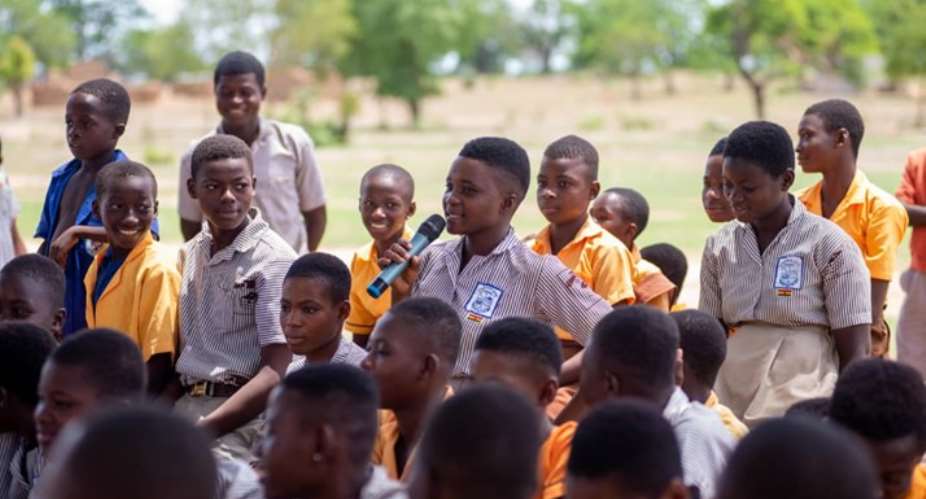Stakeholders at a community durbar organized by Investing Girls Education in Africa (IGEA)’ Ghana at the Nyangania community in the Kassena-Nankana West District of the Upper East Region have appealed to the government to ensure that all Municipal and District Assemblies in the country in awarding school building projects consider including separate changing room for girls during menstrual periods.
The stakeholders drawn from the Ghana Health Service , the Ghana Education Service, traditional and religious and opinion leaders including students, teachers made the appeal on Thursday as part of this year’s Menstrual Hygiene Day held at Nyangania in the District.
The stakeholders mentioned that majority of the girl-child do not attend school because of lack of changing rooms for girls to change during such period.
“Lack of changing rooms in many schools coupled with lack of menstrual pads have been identified as among the major factors that account for the irregular attendance of the girl -child to schools in the country,” Mr Mark Adune, School Health Coordinator Ghana Education Service said.
Mr Adune who attributed the irregular attendance of majority of girls during their menstrual cycles coupled with the inability to afford the menstrual pad underscored the need for the reduction of the tax component on menstrual pads by 20 per cent.
He commended IGEA for supporting girls in the schools periodically and entreated others to do same to help address the challenges.
Mr George Achunsa one of the parents who expressed worry about the irresponsible nature of some parents to cater for the needs of their children particularly girls stated that such trend compel some girls to bow to men who exploit them leading to teenage pregnancies.
Majority of the girl child at the programme who spoke accused some parents of refusing to buy menstrual pads for them during such periods and reiterated that this often compel them to yield to any form of inducement from men.
The Programme Director of IGEA, Mr Rusmond Anyinah, explained that the Menstrual Hygiene Day is a global advocacy platform that brings together diverse voices and actions of multi stakeholders including non-governmental organization, the media among others to promote good menstrual health and hygiene for all women and girls.
He explained that as part of complementing government’s efforts to address menstrual health challenges, his outfit promotes menstrual hygiene and quality education among rural girls in northern Ghana.
He added that the main objective of the celebration is to create massive awareness and sensitization among school girls and young women on the relevance of healthy hygiene.
“IGEA) is a non for profit organization with a mission to advocate for investment into the quality education to girls in rural parts of Africa. We have started our operation in Ghana with our first project, Menstruate and Educate. We want to minimise any hindrance that may occur in the process of young girls receiving education, through research we found that period poverty is a hindrance. By distributing reusable, biodegradable sanitary napkins, we want to equip young girls to feel confident during menstruation. Our main goal is to reduce school absenteeism and increase well being in these communities”, he stressed.





 CODEO deploys 195 observers to monitor EC’s limited registration exercise nation...
CODEO deploys 195 observers to monitor EC’s limited registration exercise nation...
 Accra 2023: Minority demands accountability of $240million expenditure
Accra 2023: Minority demands accountability of $240million expenditure
 Man sets himself ablaze after failed attempt to kill his wife
Man sets himself ablaze after failed attempt to kill his wife
 EC targets 622,000 new voters in limited registration exercise
EC targets 622,000 new voters in limited registration exercise
 Election 2024: Mahama holds 19% lead over Bawumia among first-time voters — Glob...
Election 2024: Mahama holds 19% lead over Bawumia among first-time voters — Glob...
 Saglemi: Tenants’ Union threaten court suit against private partnership
Saglemi: Tenants’ Union threaten court suit against private partnership
 We've reduced the suffering Mahama left you – Bawumia to Ghanaians
We've reduced the suffering Mahama left you – Bawumia to Ghanaians
 It's still true, FX rate will expose weak economic fundamentals; cedi far better...
It's still true, FX rate will expose weak economic fundamentals; cedi far better...
 'I'm up to the task, competent, trustworthy, hardworking' – Bawumia
'I'm up to the task, competent, trustworthy, hardworking' – Bawumia
 EC begins nationwide limited voter registration exercise today
EC begins nationwide limited voter registration exercise today
